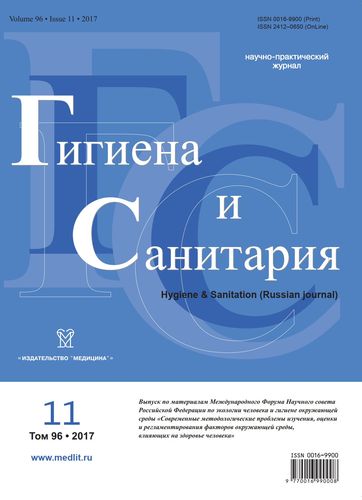Ethnic and gender characteristics of the adaptability of the circulatory system in individuals living in different environments and climatic conditions
- 作者: Meshkov N.A.1, Valtseva E.A.1
-
隶属关系:
- Center for Strategic Planning and Management of Biomedical Health Risks
- 期: 卷 96, 编号 11 (2017)
- 页面: 1029-1037
- 栏目: PROBLEM-SOLVING ARTICLES
- ##submission.datePublished##: 21.10.2020
- URL: https://vestnik.nvsu.ru/0016-9900/article/view/640700
- DOI: https://doi.org/10.47470/0016-9900-2017-96-11-1029-1037
- ID: 640700
如何引用文章
全文:
详细
The impact of environmental factors, increasing the load for the human body, can lead to the depletion of its functional reserves. In the complex of compensatory-adaptive responses of the human body, the cardiorespiratory system as the most important element is an index of the adaptive capabilities of the organism. The degree of adaptation to environmental conditions and the state of human health are largely determined by the ethnic and gender variability of the norm and pathology. The functional condition of the cardiovascular system was assessed depending on the ethnic and gender referral of the inhabitants in regions of different natural and geographical zones of the Russian Federation. In men living in different regions, indices of the functional state of the cardiovascular system were basically established to have no significant differences. The exception is the difference in individual indices among Russian men living in the Republic of Altai, the Republic of Khakassia and the Volga region, as well as among Russian men and Kazakhs, Altaians and Kazakhs residing in the Altai Republic. Among women, statistically significant differences between indices of the functional state of the cardiovascular system are found more often in Russians, and Altai, Khakas and Kazakhs females. The hypokinetic type of auto-regulation of blood circulation was shown to be more common among Kazakhs males (78.1%) and females (64.8%), Khakas males (65.9%) and Russian women in the Republic of Khakassia (59.8%). The height above sea level and air temperature (p <0.05) were established to have the greatest influence on the intensity of compensatory-adaptive responses of the cardiovascular system in the number of natural-geographical and climatic factors of the regions of residence of the men and women surveyed.
作者简介
Nikolay Meshkov
Center for Strategic Planning and Management of Biomedical Health Risks
编辑信件的主要联系方式.
Email: professor121@rambler.ru
ORCID iD: 0000-0001-6139-5833
MD, PhD, DSci., Prof., Honored Doctor of the Russian Federation, head of laboratory of the Center for Strategic Planning and Management of Biomedical Health Risks, Moscow, 119121, Russian Federation.
e-mail: professor121@rambler.ru
俄罗斯联邦E. Valtseva
Center for Strategic Planning and Management of Biomedical Health Risks
Email: noemail@neicon.ru
ORCID iD: 0000-0001-5468-5381
俄罗斯联邦
参考
- Khasnulin V.I., Sobakin A.K., Khasnulin P.V., Boykr E.R. Approaches to Division of Russia Territories into Districts Based on Environmental Discomfortable Conditions for Population Viability. Sibirskiy nauchnyy meditsinskiy zhurnal. 2005; 25(3): 106–11. (in Russian)
- Manchuk V.T., Nadtochiy L.A. The State and Tendencies in the Formation of the Health in Native People of the North and Siberia. Sibirskiy nauchnyy meditsinskiy zhurnal. 2010; 30(3): 24–32. (in Russian)
- Samarov V.V. Ethnic Features of Students’ Health from Countries of South-East Asia and Africa in Adaptation Period of Education Process on University’s Preparation Courses. Vestnik Tambovskogo universiteta. 2012; 17(1): 323–6. (in Russian)
- Niyazbekova L.S., Seyduanova L.B., Toleu E.T., Sadibekova Zh.U. Ethnographical Basics of Rural Health of Republic of Kazakhstan. Mezhdunarodnyy zhurnal prikladnykh i fundamental’nykh issledovaniy. 2015; (12): 1053–7. (in Russian)
- Sokolov A.Ya., Grechkina L.I. Sex-related and Ethnic Differences of Physical Development of Adolescents in Russian North-East. Ekologiya cheloveka. 2008; (8): 22–6. (in Russian)
- Agadzhanyan N.A., Tsaturyan L.D. Ethnic Physiology: Ecology, Adaptation, Health [Etnicheskaya fiziologiya: ekologiya, adaptatsiya, zdorov’e]. Stavropol’: SGU; 2011. (in Russian)
- Samsonova M.I., Burtseva T.E., Uchakina R.V. Ethnicity of the functional activity of pituitary-adrenal axis in teenagers in the Sakha Republic (Yakutia) and Outer Manchuria. Pediatriya. 2012; 91(2): 163–4. (in Russian)
- Tsaturyan L.D., Bondar’ T.P., Kuvandykova R.Kh. Functional activity of glucocorticoid and sex hormones in teenage boys of different ethnicities. Klinicheskaya laboratornaya diagnostika. 2013; (9): 109. (in Russian)
- Delone N.L., Solonichenko V.G. The Human’s Adaptive Phenotypes in Physiology and Medicine. Uspekhi fiziologicheskikh nauk. 1999; 30(2): 50–62. (in Russian)
- Savitskiy N.N. Biophysical Foundations of Blood Circulation and Clinical Methods Used to Study Hemodynamics [Biofizicheskie osnovy krovoobrashcheniya i klinicheskie metody izucheniya gemodinamiki]. Leningrad: Meditsina; 1974. (in Russian)
- Agadzhanyan N.A., Elfimov A.I. Bodily Functions under Hypoxic and Hypocapnic Conditions [Funktsii organizma v usloviyakh gipoksii i giperkapnii]. Moscow: Meditsina; 1986. (in Russian)
- Grebneva N.N., Nigmatullina M.V. Physical development and children’s performance in the Tyumen region. In: Respiratory and Cardiovascular System under Normal and Pathological Conditions, and During Exercise [Dykhatel’naya i serdechno-sosudistaya sistemy v norme, patologii i pri fizicheskoy nagruzke]. Tyumen’; 1990: 14–7. (in Russian)
- Tuev A.V., Khovaeva Ya.B. Structural and functional heart parameters in individuals with different arterial blood pressure. Rossiyskiy kardiologicheskiy zhurnal. 2002; (5): 33–6. (in Russian)
- Olyashev N.V., Varentsova I.A., Pushkina V.N. Cardiorespiratory System’s Indices in Young Men with Different Blood Circulation Types. Ekologiya cheloveka. 2014; (4): 28–33. (in Russian)
- Vanyushin Yu.S., Khayrullin R.R. Compensatory and adaptive reactions of the cardiorespiratory system through ontogeny during exercise. Nauka i sport: sovremennye tendentsii. 2015; 7(2): 71–7. (in Russian)
补充文件







